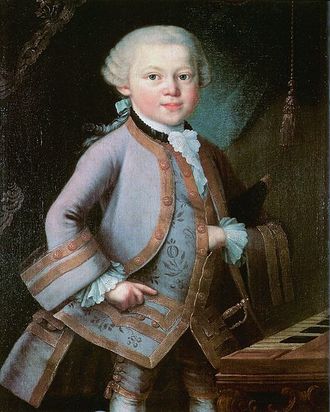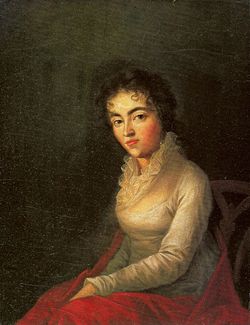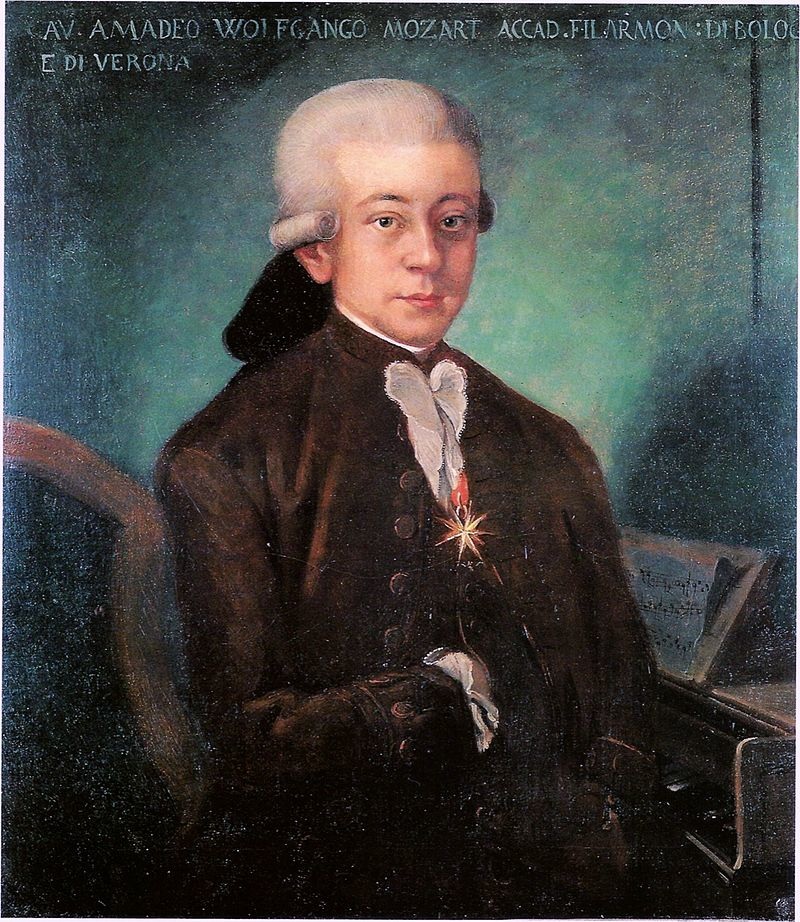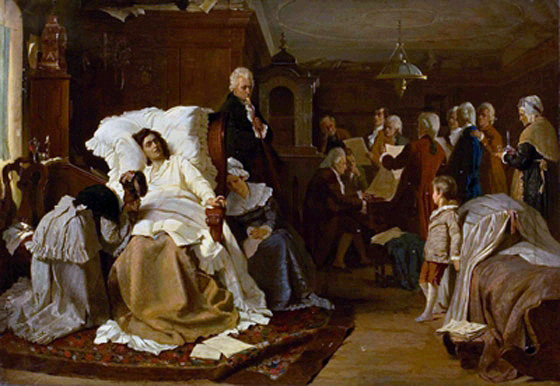Wolfgang Amadeus Mozart
1756-1791
“I pay no attention whatever to anybody's praise or blame. I simply follow my own feelings.”
 "The Boy Mozart," Anonymous
"The Boy Mozart," Anonymous
Brief Overview of Mozart's Life:
- Composing from the age of five
- Amadeus means, "Love God!"
- Born in Salzburg, what is now Austria.
- Youngest of seven, five siblings died in infancy.
- Elder sister: Maria Anna, nicknamed Nannerl
- Father was a minor composer, fourth violinist for Prince-Archbishop Salzburg. Later the deputy Kapellmeister in 1763. Wrote a violin textbook.
- Mozart was taught by his father, but quickly surpassed him musically.
- 1762-73, Mozart traveled with his family around Europe. Mozart and his sister performed as child prodigies. Went to Munich, Vienna, Prague. And then a three year concert tour in Munich, Mannheim, Paris London, The Hague, back to Paris, Zurich, Donaueschingen, and Munich again.
- Mozart wrote his first symphony when he was eight.
- Went to Italy with only his father, leaving his mother and sister behind.
- These travels cost the family, they often had to wait for a very long time from reimbursements from nobility.
- Mozart met many other musicians while traveling.
|
- In 1778, Mozart returned to Salzburg as concertmaster, with a modest pay raise. Mozart was reluctant to do so, and tried desperately to find other work before returning to Austria.
- 1781- Mozart’s opera, Idomeneo was successful in Munich.
- Mozart was summoned to Vienna where the Archbishop Colloredo treated Mozart like a servant in front of Joseph II and the Austrian court. This was in March, Mozart tried to resign the following May, which the Archbishop refused. In June, permission was granted for Mozart to leave but in an insulting way, which a literal kick in the ass from from the archbishop’s steward.
- Mozart moved to Vienna as a freelance performer and composer.
- Mozart’s own father sided with the Archbishop during this quarrel.
- He quickly established himself as the finest keyboard player in Vienna, and also prospered as a composer.
 "Costanze Mozart by Lange 1782" by Joseph Lange
"Costanze Mozart by Lange 1782" by Joseph Lange
- Mozart moved in with the Weber family, a family he had met while on tour of Europee with his family. Initially, he had been interested in their daughter Aloysia, but by the time Mozart returned to her she was married to someone else. Mozart instead turned his attentions to the third Webter daughter, Contanze.
- The two had a rocky courtship, they broke up during it. Mozart’s father did not want to approve the marriage.
- Mozart and Contanze were married in August of 1982, the day before Mozart’s consent arrived in the mail.
- They had six children between 1783 and 1791, only two of whom survived infancy.
- Mozart studied Bach and Handel, which would later influence his personal work.
- 1784, Mozart met Haydn in Vienna. They played together in an impromptu string quartet.
- Haydn in 1785 told Mozart's father: "I tell you before God, and as an honest man, your son is the greatest composer known to me by person and repute, he has taste and what is more the greatest skill in composition."
- Space and theaters were scarce, so Mozart booked unconventional spaces such as apartments and restaurants.
- Mozart saw great success, and he and his wife adopted a rich lifestyle. However, they saved no money which led to later financial hardship.
- 14, December 1784, Mozart became a Freemason.
- 1786, The Marriage of Figaro
- 1787- Don Giovanni
|
|
|
- March, 1787- Mozart’s father dies.
- December 1787, appointed “chamber composer” by Emperor Joseph II, filling the spot left by deceased Gluck.
- This position paid a modest 800 florins a year.
- 1787, Beethoven came to Vienna hoping to spend time with Mozart, but no records survive indicating that the two ever met.
- By the end of the 1780s, Mozart’s financial situation worsened. The Austro-Turkish War created a difficult time for musicians in Vienna.
- Sent letters to friends asking for loans.
- 1791- The Magic Flute.
- Mozart died on December 5, 1791, at the age of 35, while in Prague.
- His health began to deteriorate in November, suffering from swelling, pain and vomiting.
- Mozart was cared for by his wife and and her youngest sister, as well as the family doctor.
- The New Grove describes his funeral:
"Mozart was interred in a common grave, in accordance with contemporary Viennese custom, at the St. Marx Cemetery outside the city on 7 December. If, as later reports say, no mourners attended, that too is consistent with Viennese burial customs at the time; later Jahn (1856) wrote that Salieri, Süssmayr, van Swieten and two other musicians were present. The tale of a storm and snow is false; the day was calm and mild." - Did Mozart decline gradually, from fear and sadness, or whas his illness sudden?
- Did he die from disease or poisoning?
- Did someone kill Mozart? Salieri, Masons (because The Magic Flute challenged their doctrines and revealed their rituals), Jews, all of the above.
- Biographer Niemetschek about Requiem:
"On the day of his death he asked for the score to be brought to his bedside. 'Did I not say before, that I was writing this Requiem for myself?' After saying this, he looked yet again with tears in his eyes through the whole work."


